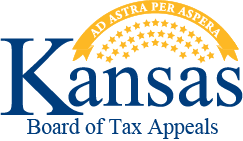About Us
Mission and Overview
Mission
The Board’s mission is to resolve disputes between taxpayers and taxing authorities promptly and impartially and to help maintain public confidence in the state and local tax system.
The Board is committed to fulfilling its mission in a highly efficient and professional manner, using all available technology and human resources to best meet the needs of the public.
Statutory Authority
Welcome to the Kansas Board of Tax Appeals. The Board of Tax Appeals is an administrative Board within the executive branch of state government and is the highest administrative tribunal for matters involving state and local taxation. Our mission is to resolve disputes between taxpayers and taxing authorities promptly and impartially and to help maintain public confidence in the state and local tax system.
The Kansas State Board of Tax Appeals is a specialized Board within the executive branch of state government. The Board was established on July 1, 2014, pursuant to Senate Bill 231. The Board’s predecessor in authority was the Kansas Court of Tax Appeals.
The Board of Tax Appeals is the highest administrative tribunal to hear cases involving ad valorem (property), income, sales, compensating use, and inheritance taxes, along with other matters involving taxation by state and local authorities. The Board is an independent tax tribunal, meaning that it is not affiliated with the Kansas Department of Revenue or any other taxing authority. The Board of Tax Appeals is an impartial decision-making body.
Divisions of the Board
The Board is comprised of two divisions – the regular division and the small claims and expedited hearings division.
Regular Division
The Board’s regular division has broad jurisdiction to hear and decide tax matters including property tax appeals, appeals from final determinations of the Department of Revenue, tax grievances, applications for exemption from property tax, county-wide reappraisal requests, no-fund warrant requests, and appeals from school districts with declining enrollment.
Small Claims & Expedited Hearing Division
The Board’s small claims and expedited hearings division is a convenient and informal forum for appealing the valuation of single-family residential properties and commercial properties that are appraised at three million dollars or less. This division also may hear appeals from the Department of Revenue Division of Taxation if the amount of tax in controversy does not exceed fifteen thousand dollars.
Jurisdiction
Residential Appeals. All appeals involving valuation of single-family residential property must be made to the small claims division.
Commercial Appeals. At the election of the taxpayer, the small claims division has jurisdiction over appeals involving valuation of commercial property appraised at less than three million dollars, excluding property devoted to agricultural use.
Division of Taxation Appeals. At the election of the taxpayer, the small claims division has jurisdiction over appeals from a decision of the Division of Taxation where the amount of tax in controversy does not exceed $15,000 or involve the assessment of a drug tax.
Hearings
Small claims hearings are informal and are generally 30 minutes in length. Hearings are held via teleconference or videoconference for the taxpayer’s convenience.
Hearings are conducted by hearing officers, who are employed by the Board on a contract basis. Hearing officers have special training in appraisal and tax law. Hearing officers may hear any testimony and may receive any other evidence deemed necessary or desirable for a just determination of the case.
Small claims hearings are not held “on the record” and no transcript of small claims proceedings is kept. Final decisions of the small claims division may be appealed to Board’s regular division. All appeals of small claims decisions are decided de novo. This means that on appeal to the regular division, the Board will not review the small claims hearing officer’s decision for error but will instead hear and decide the case anew. Evidence submitted during a small claims hearing is not retained by the Board; if a party chooses to appeal to the Regular Division all evidence must be submitted again at the Regular Division evidentiary hearing.
